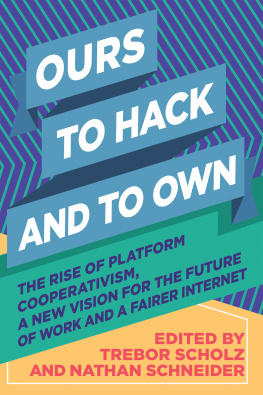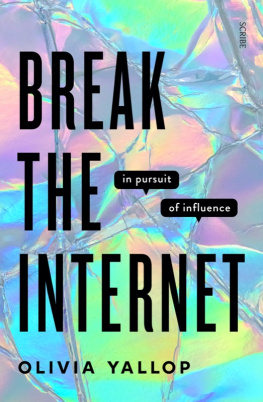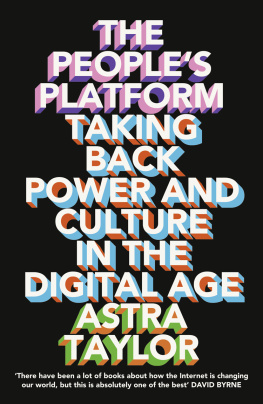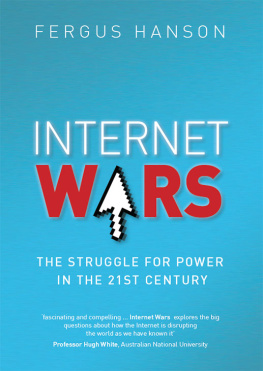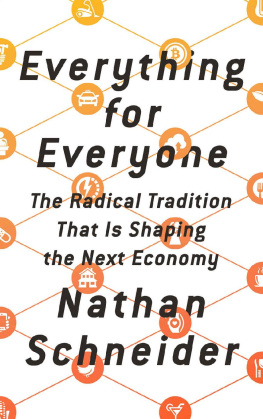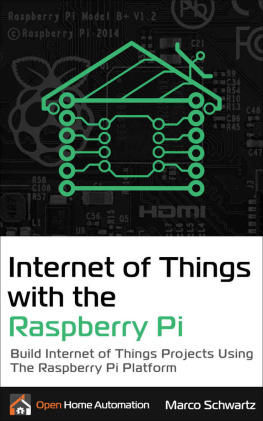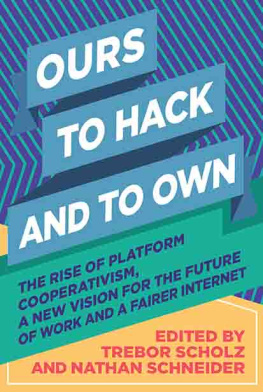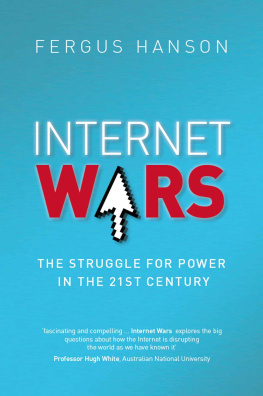


Anthology selection 2016 Trebor Scholz and Nathan Schneider.
The following authors have placed their contributions under a Creative Commons Attribution-ShareAlike 4.0 International license: Michel Bauwens and Vasilis Kostakis, Yochai Benkler, Francesca Bria, Miriam A. Cherry, Ra Criscitiello, Max Dana, Joshua Danielson, Joel Dietz, John Duda, Enric Duran, Matan Field, Noemi Giszpenc, Mayo Fuster Morell, Marina Gorbis, Jessica Gordon Nembhard, Seda Grses, Peter Harris, Steven Hill, Pedro Jardim, Francis Jervis, Mary Jo Kaplan, Dmytri Kleiner, Brendan Martin, Rachel ODwyer, Rory Ridley-Duff, Carmen Rojas, Douglas Rushkoff, Nathan Schneider, Trebor Scholz, Juliet B. Schor, Kati Sipp, Tom Slee, Christoph Spehr, Danny Spitzberg, Armin Steuernagel, Arun Sundararajan, Ashley Taylor, Astra Taylor, Cameron Tonkinwise, Akseli Virtanen, McKenzie Wark, Felix Weth, Brianna Wettlaufer, Chad Whitacre, Aaron Wolf, and Caroline Woolard.
All individual contributions to this anthology the respective author of the contribution.
Published by OR Books, New York and London
Visit our website at www.orbooks.com
All rights information: rights@orbooks.com
All rights reserved. No part of this book may be reproduced or transmitted in any form or by any means, electronic or mechanical, including photocopy, recording, or any information storage retrieval system, without permission in writing from the publisher, except brief passages for review purposes.
First printing 2016
Cataloging-in-Publication data is available from the Library of Congress.
A catalog record for this book is available from the British Library.
ISBN 978-1-68219-062-3 paperback
ISBN 978-1-68219-063-0 e-book
Text design by Under|Over. Typeset by AarkMany Media, Chennai, India. Printed by BookMobile in the United States and CPI Books Ltd in the United Kingdom.
Table of Contents
Trebor Scholz and Nathan Schneider - What This Is and Isnt About
Nathan Schneider - The Meanings of Words
Trebor Scholz - How Platform Cooperativism Can Unleash the Network
Susie Cagle - The Seven Cooperative Principles
Jessica Gordon Nembhard - Eight Facts about Cooperative Enterprise
Douglas Rushkoff - Renaissance Now
Juliet B. Schor - Old Exclusion in Emergent Spaces
McKenzie Wark - Worse Than Capitalism
Steven Hill - How the Un-Sharing Economy Threatens Workers
Christoph Spehr - SpongeBob, Why Dont You Work Harder?
Kati Sipp - Portable Reputation in the On-Demand Economy
Dmytri Kleiner - Counterantidisintermediation
David Bollier - From Open Access to Digital Commons
Stocksy United
Fairmondo
Coopify
Gratipay
FairCoop
Members Media, Ltd. Cooperative
TimesFree
Snowdrift.coop
Resonate
Loconomics Cooperative
NYC Real Estate Investment Cooperative
Robin Hood Collective
Seed.Coop
Yochai Benkler - The Realism of Cooperativism
Janelle Orsi - Three Essential Building Blocks for Your Platform Cooperative
Caroline Woolard - So You Want to Start a Platform Cooperative...
Melissa Hoover - What We Mean When We Say Cooperative
David Carroll - A Different Kind of Startup Is Possible
Marina Gorbis - Designing Positive Platforms
Cameron Tonkinwise - Convenient Solidarity: Designing for Platform Cooperativism
Seda Grses - Designing for Privacy
Danny Spitzberg - How Crowdfunding Becomes Stewardship
Arun Sundararajan - Economic Barriers and Enablers of Distributed Ownership
Ra Criscitiello - There Is Platform-Power in a Union
Saskia Sassen - Making Apps for Low-Wage Workers and Their Neighborhoods
Kristy Milland - The Crowd: Naturally Cooperative, Unnaturally Silenced
Tom Slee - Platforms and Trust: Beyond Reputation Systems
Michel Bauwens and Vasilis Kostakis - Why Platform Co-ops Should Be Open Co-ops
Loomio Cooperative Ltd.
The FairShares Model
Swarm Alliance
Ms., The Madeline System
Purpose Fund
rCredits
External Revenue Service
Data Commons Cooperative
Coliga
CommunityOS: Callicoon Project
Backfeed
My User Agreement
John Duda - Beyond Luxury Cooperativism
Brendan Martin - Money Is the Root of All Platforms
Carmen Rojas - From People-Centered Ideas to People-Powered Capital
Karen Gregory - Can Code Schools Go Cooperative?
Palak Shah - A Code for Good Work
Micky Metts - Meet Your Friendly Neighborhood Tech Co-op
Michael Peck - Building the Peoples Ownership Economy through Union Co-ops
Mayo Fuster Morell - Toward a Theory of Value for Platform Cooperatives
Francesca Bria - Public Policies for Digital Sovereignty
Miriam A. Cherry - Legal and Governance Structures Built to Share
Rachel ODwyer - Blockchains and Their Pitfalls
Astra Taylor - Non-Cooperativism

1. What This Is And Isnt About
Trebor Scholz and Nathan Schneider
This is a guidebook for a fairer kind of Internet. While we intend to foster something new in the online economy, we do so by turning to something old: the long tradition of cooperative enterprise. The problems of labor abuse and surveillance that have arisen with the sharing economy, also, are not entirely new; they have much in common with struggles on nineteenth-century factory floors. By considering the emerging platforms in light of well-hewn cooperative principles and practices, we find an optimistic vision for the future of work and life.
Already, this strategy is catching on. Workers, organizers, developers, and social entrepreneurs around the world are experimenting with cooperative platforms and forming conversations about platform cooperativism. This book, therefore, is an effort to serve a movement in the making, to add to the momentum we and our fellow contributors already feel.
We each came to platform cooperativism by somewhat separate paths. Trebor had been convening the Digital Labor conferences at The New School since 2009, from which arose an earlier book, The Internet as Playground and Factory . In publications like The Nation and Vice , Nathan was reporting on the protest movements of 2011 and efforts among young people to create ethical livelihoods, online and off, once the protests receded. We met at OuiShare Fest in Paris in 2014, and, at Trebors Sweatshops, Picket Lines, and Barricades conference later the same year, we both sensed it was time to think about constructive alternatives to the dominant Silicon Valley model.
That December, Trebor published Platform Cooperativism vs. the Sharing Economy, framing this concept that would come to be this movements moniker. The same month, Shareable published Nathans article Owning Is the New Sharing, which mapped out some of the efforts to build cooperative platforms already underway. Realizing our common interest, we discussed these ideas with interested platform-workers, labor advocates, techies, and ludditesmany of whom, we found, were venturing into various forms of platform cooperativism already. We agreed it was time that they should meet each other.
In November 2015, we held a two-day event called Platform Cooperativism: The Internet, Ownership, Democracy at The New School. More than a thousand people came, including New York City Council members, CEOs, investors, platform creators, and leading scholars. The Washington Post deemed the event a huge success. Shortly after, the Rosa Luxemburg Foundation published Trebors primer on platform cooperativism, which has been translated into at least seven languages. Follow-up events have taken place in Barcelona, Berlin, Bologna, Boulder, London, Melbourne, Paris, Rome, Milan, Vancouver, and elsewhere.
Next page
